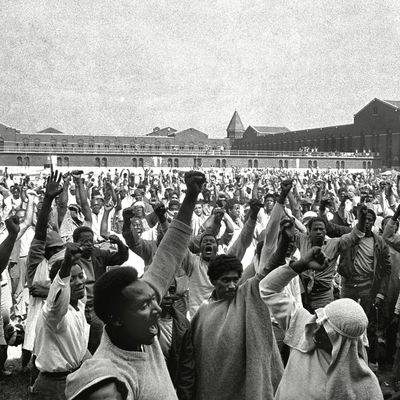
America’s inmates do not want to perform slave labor anymore. They would also like fully staffed facilities (so that fewer of them get murdered or raped); universal access to rehabilitation programs; voting rights; the power to press their grievances in the federal court system (a right that was significantly abridged by legislation passed under Bill Clinton); and to reduce their own ranks by aligning our nation’s draconian sentencing laws with international standards, and ensuring that black prisoners are not discriminated against in opportunities for parole.
Authorities have long insisted that these are unreasonable requests. So, America’s prisoners are going on strike.
Organizers at penal institutions across the country have planned a series of actions that will begin on August 21 and continue until September 9, dates that mark the anniversary of the ill-fated uprising at New York’s Attica Correctional Facility in 1971. The actions will include work stoppages, boycotts of companies that exploit prison labor, sit-ins, and hunger strikes.
One might think that “slavery should not be legal under any circumstances” and “prisons should be staffed well-enough to ensure that inmates are not killed and sexually violated on a regular basis” would be uncontroversial sentiments in the 21st-century United States. But much like “everyone should have access to basic medical care” and other left-wing fantasies, freeing prisoners from the burdens of forced labor and mass rape is the kind of proposal that sounds nice in theory, but just doesn’t add up mathematically. Would it be swell if our shining city on a hill had a prison system that didn’t subject its inmates to food-borne illnesses, slave labor, and internationally recognized forms of torture? Sure. But we simply can’t afford it.
As various officials explained to Vox’s German Lopez:
For the state, a big problem is costs. Hiring more guards — and paying guards more to make the job more attractive to more people — costs money. So does improving prison conditions in general. All of that is cash that could be spent elsewhere.
… Prison officials say they couldn’t afford to pay inmates more. They point out that there are many extra costs tied to prison labor — such as the chance of lockdowns, security needs, and the costs of inmates’ housing, food, and health care. As California Department of Corrections and Rehabilitation spokesperson Jeffrey Callison told me, “The per capita cost of one inmate in our prison system now exceeds $80,000.” Those are expenses employers in the free world don’t typically have to carry.
As a response to the prisoners’ demands, this rebuttal is, of course, morally and fiscally insane. The fact that it is expensive to keep criminal offenders in safe, humane prisons is not an argument for keeping them in unsafe, inhumane ones — rather, it is an argument against incarcerating an exceptionally high percentage of our population.
America simply cannot afford its mass incarceration habit. It is weighing on our beleaguered state budgets, and devastating our civic health. For a little while there, in the wake of the 2008 recession, we were able to admit we had a problem. But old habits are hard to kick. And so, instead of weaning ourselves off a draconian conception of justice, we’ve opted to pretend that we can quit it anytime we want — while sacrificing more and more of our putative values on the altar of our addiction. Thus, South Carolina decided that it could sustain its populous prison system by skimping on guards (even as the number of murders in its correctional facilities quadrupled), until a deadly riot at the Lee Correctional Institution captured national headlines this April — and helped trigger this week’s strikes.
The wealthiest nation in human history does not need slaves to fight its fires. When our officials suggest otherwise, their protests are no more serious or rational than those of a white-collar cocaine addict who insists that he simply can’t afford to pay child support.
The prison strikers’ first aim is to ameliorate their own conditions. But the rest of us would not be doing them any selfless favor by meeting their demands. We all stand to benefit from reducing America’s prison population, and providing those who remain behind bars with living conditions that are compatible with their betterment. America’s addiction to mass incarceration victimizes everyone within its borders. We should thank our nation’s inmates for staging this intervention — and, thereby, evincing an improbable faith in our republic’s capacity for rehabilitation.






























